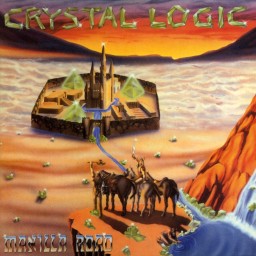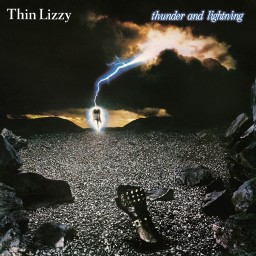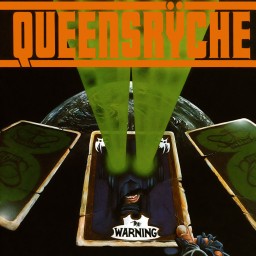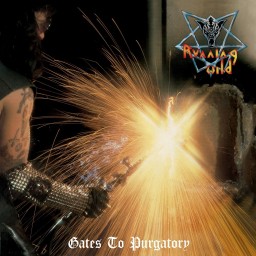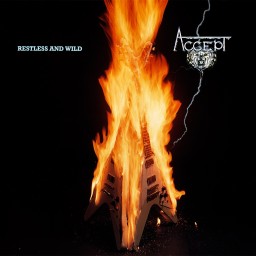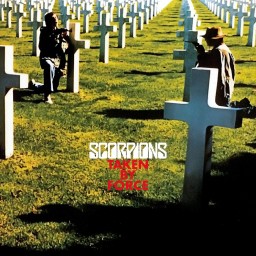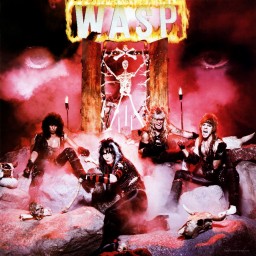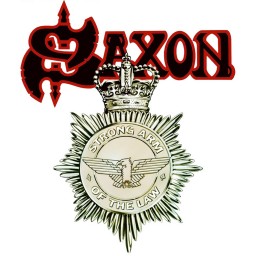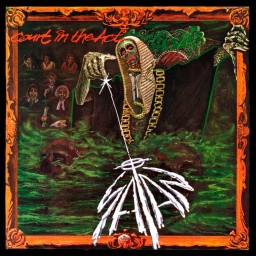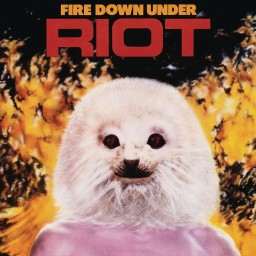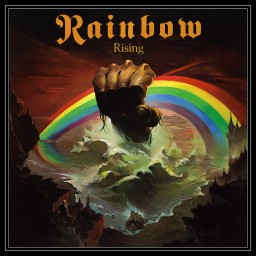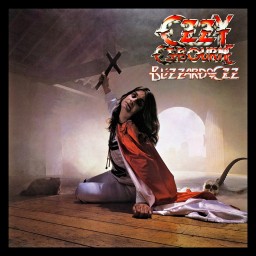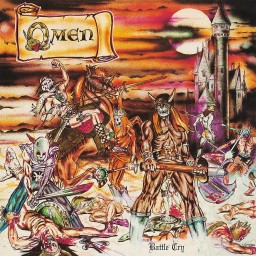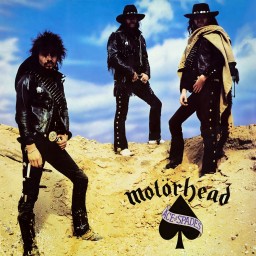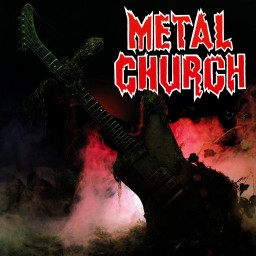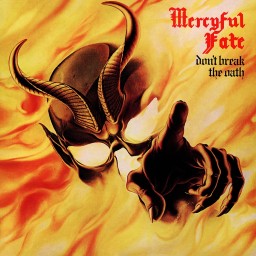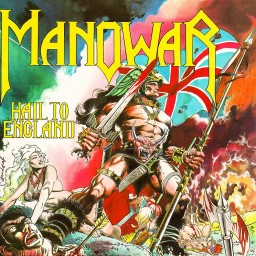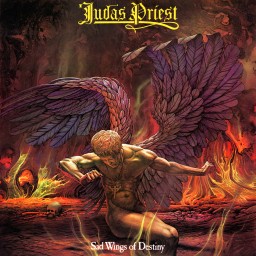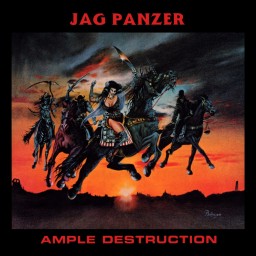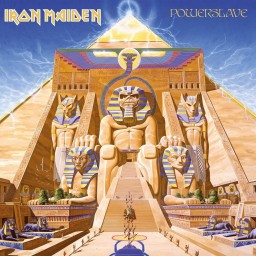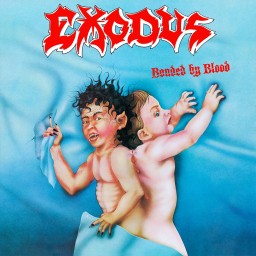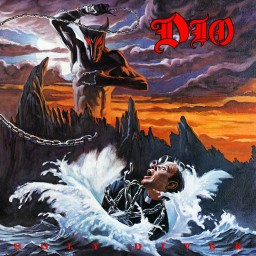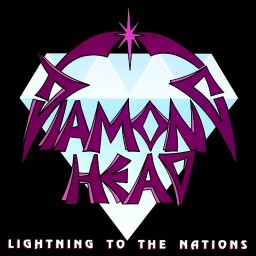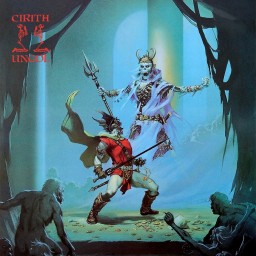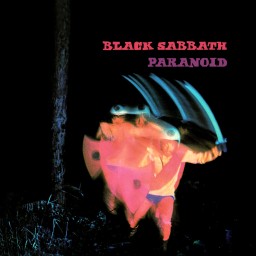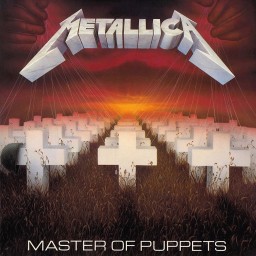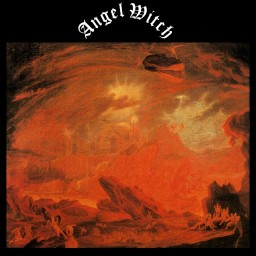Tymell's Reviews
Crystal Logic is honestly one of the purest representations of heavy metal around. It's like a primer on the genre in its original form at this time. It's not necessarily that it's the most epic (though it is epic), nor that it has the best riffs (though it has good riffs), it's just such a concentrated little nugget of what made heavy metal.
Like the wider genre, it's an acquired taste, brimming with cheese that you really need to be in the right mood for. If you are, and can let yourself get carried away into the D&D-inspired worlds of fantasy, this is going to be a wonderfully rewarding ride. Likewise, Mark Shelton's supremely nasally vocals aren't going to be for everyone, but again, if you can just go with it, they're such fun and full of narm charm. Just like in classic role-playing fashion, you can just get into it.
"Necropolis" is a wonderful example, such a fun, catchy ride, and "Flaming Metal System" opens with appropriately molten guitar work. "The Veils of Negative Existence" takes a dip into doomier territory, while tracks like "The Riddle Master" and "The Ram" cut loose part way through and ramp things up into raw speed. "The Ram" in particular just absolutely lifts off into the stratosphere out of nowhere, the band just deciding "Fuck it, let's rip this shit up!".
As the above illustrates, this is an album with a nice degree of variety in flavours while still maintaining a consistent tone, but even beyond that, it just -feels- like heavy metal in its undiluted form. The unabashed cheese, the emphasis on the riffs, the flashy work that complements rather than overpowering, the willingness to just cut loose and go with the flow, it's all there. There might be albums that take individual aspects to other levels or places, but this -is- heavy metal, right here.
Sadly, there is one minor elephant in the room: "Dream of Eschaton". It's a great closing song, with a hell of a hook in its crunchy stomp, and right away it put me in mind of Angel Witch's "Angel of Death". In fact, the more I listened, the more apparent it was, and indeed, some quick research reveals that Shelton even talks about direct "inspiration" in this regard, all but admitting the main riff and rhythm was lifted from there. It's a shame, as it's clear Manilla Road are capable of putting out quality stuff on their own.
Choice cuts: Necropolis, The Ram, The Riddle Master
Genres: Heavy Metal
Format: Album
Year: 1983
Thin Lizzy were well into their career by this point, though I assume like many, my primary exposure to the band prior to this was through their more well known hits like "The Boys are Back in Town" or their version of the ballad "Whisky in the Jar".
Certainly, Thunder & Lightning doesn't feel too terribly far removed from those. It's 80s hard rock with enough of a NWOBHM spice to pass at times, especially in the frequently flashy guitar work ("Cold Sweat" being a sterling example). It's also a good dose of it for those who have had enough of more sleazy shock rock of the era; there's a certain level of restraint and even respectability about this. But there's also not a lot of weight or character to the music on show here. It's fine, but that's often all it is: just 'fine'. There's the occasional hook but not a lot, and songs like "Bad Habits" can be enjoyable, but they just don't leave much of an impact behind them.
The one real exception is "The Holy War". The constant beat there really does conjure the image of a march to war by an army of righteous crusaders, and it's catchy as hell to boot. Definitely the stand-out of the album. The title track also does strive for something a bit meatier than much of the rest, but the metalhead in me still craves something more.
To be clear, it's not an issue of Thunder & Lightning "not being metal enough" or the like. There's plenty of good rock material from this era, but Thunder & Lightning just plays it too safe to be anything more than passable.
Choice cuts: The Holy War, Cold Sweat
Genres: Heavy Metal
Format: Album
Year: 1983
Queensryche's debut album is certainly an interesting little beast for its time, indicative at times of the later heights the band would ascend to in Operation: Mindcrime, but definitely not at that point yet.
In an era dominated by doom merchants, emerging thrash and rough-n-ready classic metal, The Warning is a surprisingly melodic and even light affair. That's not intended as a critique, just a stylistic choice: if you want something dark or gritty, you're better off with Bathory or Slayer. Queensryche aren't a total departure, they still fit under the general umbrella of metal in the 80s, with soulful crooning that calls Rob Halford's vocals to mind (see "Child of Fire") as well as a melodic parade of sound not entirely removed from Maiden's works.
Still, as an album this does stand out as a band doing their own thing back in the day, and I have to give it props for that. These songs are comfortable shifting gears as they go, ramping up into something epic and dramatic at times, or dipping into something quieter at other moments. It comes at a time when many contemporaries took a more traditional approach to song structure. Queensryche aren't just belting out some solid riffs in standard verse-chorus structure, they're shifting and flowing as they go.
Geoff Tate's vocals are also a real highlight here. He's capable of rising into some impressively glass-shattering notes and wails, but doesn't rely on that as a crutch. Whatever style of delivery is used, it's always powerful and impassioned. Just listen to those soaring lines belted out in "Roads to Madness", leading seamlessly into the guitar eruptions that follow the high points. Headbanging rhythms are accompanied by epic shrieks, even if the song takes a little longer to get going that it needs to.
That said, the album as a whole is something of an acquired taste. For big fans of early progressive metal, this will likely be a vintage treat, as you can hear it laying the groundwork for later refinement. There's a skill and a willingness to experiment, but it's still formative. "No Sanctuary" is a perfect example: it has a pleasant enough melody and feels like it's rising into something, but it kind of just meanders along for 6 minutes. Only in the last 30 seconds does it really feel like it takes off, then it fades out just as it starts to get good. This is a pattern repeated elsewhere, not in the exact same way, but the same issue of good ideas or moments, but not quite pulled together into a truly satisfying whole, at least for me. It's a decent piece of work with plenty of future promise (a "warning" even, if you'll pardon the cheeky pun), but unless you're a real aficionado of the style, it might not come together fully.
Choice cuts: Take Hold of the Flame, Roads of Madness
Genres: Heavy Metal
Format: Album
Year: 1984
I've pretty much always known Running Wild weren't always pirate-themed, that it was only really with their third full-length, Under Jolly Roger, that they became the salty sea dogs we know them as today. But I'd never actually tried out those early pre-pirate releases, so this one would be an interesting experience.
Instrumentally, it's not a radical departure. There are some tracks where it shifts into slightly unexpected territory, but you can certainly hear the same gritty speed metal that would carry them on so well later on. Lyrically though, this is very much a different kettle of fish. It's surprisingly dark, by early 80s standards anyway, with an infernal theme loud and clear. You're hard-pressed to find a song on here that doesn't reference Satan and/or Lucifer; "Preacher" could easily be a Mercyful Fate track sans King's falsetto delivery, while "Soldiers of Hell" would feel right at home on any of Venom's early albums. Like those bands, this might not strictly fit in as "black metal" per se, but the lyrical direction is there.
And honestly, it's a good time. Setting aside any existing expectations of a Running Wild album, this is decent speed metal. "Genghis Khan" has a great fun rhythm to it, the sort they'd later put to great effect in their sea shanties. "Soldiers of Hell" has some absolutely gorgeous solo work that really carries you off and away. "Adrian S.O.S." and "Victims of States Power" are straight-up thrash fucking metal. The vocals can at times be a bit buried in the mix, but that aside this is solid stuff.
I can certainly see why the style changed later, as there's a vibrancy in the instrumentation here that can feel at odds with the darker lyrical themes. Something had to change, and I'd happy Running Wild went in the very rewarding direction they did. That said, Gates to Purgatory might not be part of the iconic Running Wild catalogue, but it's definitely worth a spin for any classic speed metal fan looking to be Lucifer's friend!
Choice cuts: Preacher, Soldiers of Hell, Genghis Khan, Adrian SOS
Genres: Heavy Metal Speed Metal
Format: Album
Year: 1984
The veterans of Accept have had a winning streak lately (at time of writing), with a wonderfully received comeback in 2010's Blood of the Nations, and a seemingly unstoppable string of solid albums since then. Of course, the reason Nations and others made such a splash is precisely because of the band's legacy, and it's Restless and Wild, along with Balls to the Wall, that really made that legacy.
Certainly, this album shows a band having a blast, loud and clear, and good at what they do. Accept's sound here is often comparable to AC/DC in their cut-loose style of heavy rocking, but with a dollop more aggression here. "Fast as a Shark" even strays into solid proto-thrash territory, though most of the rest of the album doesn't quite go for that same level of vitriol. Still, it's ballsy, wild stuff from start to finish.
And really, how well that works for you is just a matter of taste and what you might be looking for at any given time. As you peruse the menu of late 70s/early 80s metal, are you after something fantastical (Ranbow), darker (Black Sabbath), maybe something with more of a punk edge (Motörhead)? If you fancy something a bit more straightforward and hard rocking, while still managing to take things a few notches heavier than German contemporaries Scorpions, this should do the ticket. Personally, I like my early metal a bit heavier, and while Restless and Wild does have some good numbers, it feels a bit too standard for its age, for me.
Choice cuts: Fast as a Shark, Princess of the Dawn
Genres: Heavy Metal
Format: Album
Year: 1982
Probably like many, my main exposure to Scorpions prior to this was "Rock You Like a Hurricane". Taken by Force predates that by some years, so I thought it'd be interesting to hear what was there before.
I'm going to cut straight to the most important point here: "The Sails of Charon" is amazing. Every part of it, the funky riffs at the core, Uli Roth's gorgeous lead work, the twisting, snaking, menacing vibe that it oozes, it's all vintage heavy metal. It's that classic sound where everything gels and flows so well, and will lead to so much in later years. "Sails of Charon" is a track that deserves to sit proud among other early classics like "Don't Fear the Reaper" or "Children of the Grave", and whatever else I have to say about the album as a whole, this song should be in any metalhead's collection.
As for the rest of the album...it's fine. It's decent. There's some good and some bad. It's hard not to be overshadowed around a track like "The Sails of Charon", honestly. None of the other songs on here are bad (though I'll admit "He's a Woman, She's a Man" feels a bit dry and overly reliant on just repeating the title). It treads the sort of lines you'd expect during the 70s, when hard rock was starting to give birth to heavy metal. There are typical but effective rockers like "Suspender Love", "I've Got to be Free" and "Steamrock Fever" (in which I actually enjoy the use of construction sounds and children chanting), and others that play a bit more with quieter moments. "Your Light" is a lazy river drifter with funky bass groundwork, "Born to Touch Your Feeling" harkens to some of Aerosmith's more effective ballads, and "The Riot of Your Time" has a nice rising sense of energy. "I've Got to be Free" is another of the harder tracks here, and probably the one that works best, just with sheer catchiness.
But despite all the praise I can give to these individual moments or elements, something's missing from the whole. Most of the songs on here are good, but rarely do Scorpions genuinely impress me like some of their contemporaries. Black Sabbath were darker, Led Zeppelin more ambitious, Motörhead nastier, Judas Priest sharper, AC/DC committing more fully to the rock aesthetic. Most of Taken by Force is good, but I can't say I'm going to stick the album on much after this review.
Except for "Sails of Charon". That shit rocks.
Choice cuts: I've Got to be Free, The Sails of Charon
Genres: Heavy Metal
Format: Album
Year: 1977
W.A.S.P. garnered a lot of attention and publicity for themselves in their early days with their sexually charged and often violent lyrics and imagery. Of course, there were plenty of bands at the time (especially metal bands) pushing these sort of topics even further, but many of them remained firmly in the underground scene, and didn't gain the same hostile spotlight from concerned parents and the like, while W.A.S.P. seemed to actively court such attentions. They often seemed like KISS' nastier sibling, locked away for years and now out, loose and on the prowl.
Musically, this is certainly a comparison that holds up in their debut, self-titled full-length. There's an ever-present emphasis on driven, hard rocking melodies, songs dominated by catchy and repeated choruses. It's an album that constantly conjures images of packed arenas chanting along, and maybe even some scantily-clad chorus girls kicking along in a line (see "The Flame" for a perfect example).
It's an album of unashamed old-school rock 'n' roll sleaze, and with enough sincerity among the cheese to carry it off more often than not. "L.O.V.E. Machine", "School Daze", "Hellion", "On Your Knees", these songs are just as you'd expect given the titles. There's always the sensation of cutting loose and going along with it all.
Certainly, W.A.S.P. do this well, but are a bit too focused on it here. Your mileage may vary based on personal tastes, but I do find this album a little too fond of repeating the chorus lines ad nauseum. There's fun in chanting along with such lines of course, but however catchy these lines might be, it still runs the risk of becoming tiresome the longer it goes on, and plenty of these songs are guilty of outstaying their welcome in this regard. More than once I end up willing the song to get a move on and stop sounding like a record stuck in place. Though worth mentioning, "The Torture Never Stops" gives a glimpse of something a bit more aggressive, even thrashy for its day, and it's a shame it only comes right at the end of the album.
All told, this album does have a good time, sing-along quality to it with a nice degree of crunch among the melody, but the song-writing would become much more refined on future works like The Headless Children and The Crimson Idol.
Choice cuts: The Torture Never Stops, I Wanna Be Somebody
Genres: Heavy Metal
Format: Album
Year: 1984
Wheels of Steel was a bonafide classic, and Saxon wasted no time in following it up with Strong Arm of the Law just 5 months later. So it's no surprise that it isn't any radical departure of sound. Saxon still have the same crisp, riff-driven crunch, the same sense of hard rocking wild abandon, and Biff's energetic vocals leading the charge.
If there's a slight difference, it's that Strong Arm feels like it leans a little more heavily onto the rocking side than the (at the time) emerging metallic force, and for me that makes it the marginally weaker of the two, but it's a minor quibble. If Wheels was the A-side, this is the B-side, and there's still plenty of killer material here.
"Heavy Metal Thunder" is a true, 100% metal anthem, and can proudly sit alongside others from the era of the genre's true eruption. "20,000 Ft" is just so much fun with its funky sort of bounce. The delicious bass rumble of "Dallas 1pm" evokes the motorcade heading towards the infamous assassination, and the sudden cut to near silence works beautifully like sudden shellshock, while the following solo work has a mournful tone to it.
These sort of tracks are solid, vintage Saxon, but there are a couple of weaker numbers too. "To Hell and Back Again" relies a bit too much on repetition of its main line: it essentially does the same thing as "Thunder" and "Strong Arm" do, but just not as well. "Hungry Years" has a great little groove to it, but not much else, and it wears a bit thin by the end.
As a whole, Strong Arm eases off the gas just a tad from Wheels of Steel, tending more to cruise than belt down the highway, but both are perfectly enjoyable and solid early metal albums. Everything here announces itself with a burst of confident riffing, and this carries across as you listen. It's hard not to get swept up, whether the song's subject matter is something momentous or mundane, you just can't help but match the enthusiasm of Saxon themselves.
Choice cuts: Dallas 1pm, Heavy Metal Thunder, 20,000 Ft, Taking Your Chances
Genres: Heavy Metal
Format: Album
Year: 1980
When we talk about the earliest thrash metal, 1983 is often cited as a birth year thanks to a few key releases: Metallica's Kill 'em All, Slayer's Show No Mercy, maybe Exciter's Heavy Metal Maniac too. I'd add Satan's Court in the Act into that mix, maybe not as a strictly "thrash metal album", but undoubtedly as an illustration of the emerging sound and an influence on some later bands.
At the core it might be classic heavy metal, but here Satan are clearly showing an increased focus on sharpened speed and aggression. It might not be overly progressive as an album, but it can still feel well ahead of its time, even sounding like a precursor to later mergers of power metal and thrash together.
All that genre waffle out of the way, it should come as no surprise that the dominate characteristic here is the sheer force with which all this is delivered. There's a wild sense of abandon, the very sort of thing that would help thrash define itself from speed metal, a hunger for refined discordance, an application of molten riffs to help push forward the whole atmosphere of rebellious carnage. Just listen to the mad dancing jig of "The Ritual" or the machinegun pace of "Trial By Fire" or "Break Free".
The only real thing holding Court in the Act back is the less refined production. You can tell what's under the surface is quality stuff, but it can at times sound muffled and sadly restrained by this point. Nevertheless, Court in the Act is a worthy investment for anyone looking for some traditional metal with a decidedly sharp, aggressive edge, discarding most of the genre's rock roots in favour of something entirely metallic.
Choice cuts: Trial By Fire, The Ritual, Blades of Steel
Genres: Heavy Metal
Format: Album
Year: 1983
Fire Down Under is a good time. A damn good time. And Riot will leave you with little choice but to join in on those good times.
There's such a crazy sense of wild, unabashed fun here, the band sounds like they're absolutely having the time of their lives making this, and that's infectious as all hell. Just listen to the whooping in "Run For Your Life", or the disgustingly catchy fret dancing on the title track. The whole album has the feel of a heavy metal version of a party in a rowdy tavern: lively and vibrant, with just the right dose of rough and ready punch.
The first four tracks in particular are totally irresistible: "Swords and Tequila" in its driving chorus, "Fire Down Under" in its breakneck riffing, "Feel the Same" in that smooth, sexy rhythm and sway, and "Outlaw" in just how damn catchy it is. Every one of them works in its own way, and will leave anyone hooked.
If there's any downside, it's that this does leave the album as a whole a bit front-loaded. The rest of the material here is perfectly good, but the best songs are undoubtedly early on.
Riot don't necessarily do anything particularly inventive or ground-breaking here, but they don't need to, because they do what they set out to with such panache. They take the wonder of Rainbow, mix it with the working class hard rocking of Saxon, and give us something brimming with real passion and energy, and well worth a look for any classic metal fans.
Choice cuts: Fire Down Under, Swords & Tequila, Outlaw, Run For Your Life, Feel the Same
Genres: Heavy Metal
Format: Album
Year: 1981
It took me a long time to get around to listening to Rainbow's Rising. Don't make my mistake: listen to it. Listen to it again if you already have. Listen to it while you read this. Because if you're any kind of fan of rock 'n' roll or heavy music, you will enjoy it. It's simply that good.
It's hard to properly convey just how superbly crafted Rising is in words, as a reviewer I forever want to stick the album on and say "See?" to the reader. It doesn't necessarily break any boundaries, it just makes everything work so well. One of the most striking aspects, and as good a place to start as any, is how the album is so startlingly devoid of filler or fat in any form. Not a moment is wasted, every track is an absolute belter, and every part of each works. It's just six tracks of pure rocking brilliance.
Ronnie James Dio and Ritchie Blackmore is a match made in heaven, with Dio's gorgeous vocals and Blackmore's fantastic guitar work sitting side by side. Just listen to the way they play off each other to make "Lady Starstruck" so insanely catch, both shining and complementing one another. Or the crazy fun that is "A Light in the Black", which demands that you nod your head, tap your foot and sing along with Ronnie that you're "coming hoooome!". Then it treats you to some of the most succulent keyboard and guitar soloing to be had.
The song-writing on show here is fun and catchy without ever feeling dumbed down, and Rainbow are masters at evoking awe and wonder alongside the straightforward rocking. "Stargazer" is a perfect example, a tale to be told of an epic journey. Ronnie sings of the heat and the rain, the towers of stone, and Eastern-sounding melodies mingle with the constant marching pound of the drums to paint pictures of a trek across a vast, scorching desert, and all the wondrous sights along the way.
Rising gets a 5/5 because I simply can't justify giving it anything less. There isn't a wasted moment here, not an ounce of fat to be trimmed, not a single solitary bit of filler, just six tracks of pure, concentrated awesome, and every fan of heavy music should have this one in their collection.
Choice cuts: Stargazer, A Light in the Black, Lady Starstruck, Tarot Woman
Genres: Heavy Metal
Format: Album
Year: 1976
The Ozzy-fronted Black Sabbath was of pivotal importance in the emergence of heavy metal music, but after a decade with the band he was fired from it. All the drama and potential reasons for it aren't to be discussed here, but it did pave the way for Ozzy to embark on his solo career, which kicked off in 1980 with Blizzard of Ozz.
Sabbath themselves had been suffering a little, with the last couple of Ozzy-fronted albums being poorly received, but earlier in 1980 they released the universally acclaimed Heaven and Hell with Dio at the helm. Now it was Ozzy's time to establish himself, and it's clear he intended to go in a somewhat different direction. Where Heaven and Hell saw a resurgence of the heavy metal at the core of Sabbath, Blizzard of Ozz opts for something a bit more accessible and light, leaning a little more towards hard rock than outright heavy metal.
This isn't to say it's bad of course, and there are some absolute bangers on here. "Crazy Train" is regarded as a classic for very good reason. It bounds along with so much momentum, and is all put together so well, rising into that catchy chorus with perfect timing and knowing just when to shift gears. Both "Goodbye to Romance" and "Revelation [Mother Earth]" show just how good the gentler parts of the album can be. Ozzy's vocals work surprisingly well as melodic, mournful crooning, and "Revelation" gives way to some absolutely glorious work from Randy Rhoads, the whole song climbing and ascending before suddenly crashing into silence.
The other big number here, "Mr. Crowley" is...okay. Honestly, I find it pretty dull for the most part, leaving me cold until Randy's molten guitar solos kick in. They're the obvious highlight, and vastly outshine the rest of the track.
The other songs on here are generally good, but don't stand out so much. "Steal Away" is a decent toe-tapper that calls to mind some of Rainbow's more melodic numbers, while "Suicide Solution" makes good use of Ozzy sounding like a demon waiting for you to seal a pact.
Overall, this is a much brighter offering than the sort of proto-doom Sabbath were known for, at least in their early days. It maybe doesn't mesh quite so well with the whole "Prince of Darkness" title Ozzy had, and the metalhead in me has a taste for darker or heavier things, but it's still a decent time. There aren't really any bad tracks, but there are really only a handful of truly good ones, and the rest are just sort of there.
Choice cuts: Crazy Train, Goodbye to Romance, Revelation [Mother Earth]
Genres: Heavy Metal
Format: Album
Year: 1980
A battle cry indeed, Omen's debut album is a rip-roaring ride through wild carnage and hedonistic revels. It takes the cheesy glory of NWOBHM and has some real fun with it, though it's a style that will be improved upon in years yet to come.
As a whole, it feels not dissimilar to the epic approach of Manowar, though where they opted for more of a mid-pace stomp, Omen take things a little faster and more ferocious (save for "In the Arena", which is pure Manowar). Where Manowar might be the steady, grandiose march to war, Omen are the energetic battle itself.
However, where I think bands like Manowar or Iron Maiden have the edge is in the uniqueness and focus of their output. With them, everything feels like it's locked on to creating something all their own, each song another flavour of this very clear end goal. Omen are undoubtedly good at what they do, but it's not quite such a unique end product, and a lot of the tracks can end up sounding like different passages of the same song.
Still, while maybe not as flavourful as a whole as some others, Battle Cry does have some killer offerings within. "Death Rider" and the title track are probably the best single examples of their brand of forceful power metal, ramping up the aggression of classic metal and adding in some fantastical theatrics. "Prince of Darkness" is also a blast, full of toe-tapping pace and lyrical acrobatics. The 'sleaze rock in a fantasy setting' lyrics of "Be My Wench" are a bit at odds with the battle metal music, but there's still some tasty forceful riffing there. And "The Axeman" knows exactly what it's about right from the get-go.
All in all, a solid offering of heavy metal beginning to branch out, even if some others managed to form a more distinct identity for themselves.
Choice cuts: The Axeman, Prince of Darkness, Battle Cry, Death Rider
Genres: Heavy Metal
Format: Album
Year: 1984
Lemmy himself, before he decided to say "Fuck it," and take his skills on tour into the afterlife, said that Motörhead was never a heavy metal band. That might seem like an odd statement regarding a band that is pivotal to the genre to so many, but it always made perfect sense to me. For me, Motörhead's big appeal has always been that they so deftly and so naturally bridge the worlds of punk, heavy metal and rock 'n' roll, without confining themselves to any one sphere. It's the classic rock 'n' roll attitude, punk's endearing recklessness and heavy metal's razor-sharp edge, all married so well, and Ace of Spades is one of the albums that represents that in its purest, though not perfect, form.
It's a perfect summary of the Motörhead sound really, the soundtrack of a filthy, sleazy, smoke-filled, booze-fuelled dive bar and all the seedy, crazy goings-on that happen there. Its greatest strength is the consistency of this attitude, for there isn't really a true dud here, and the best offerings here are some of the best of even the full and extensive Motörhead catalogue.
So why only the 3.5/5? Well, as heretical as it might be to say it, it's because those best songs really overshadow the rest and can make a lot of the album feel fairly disposable. At its best, it's fantastic: "Please Don't Touch" is an irresistible groove, with Lemmy at his gravelliest. "We Are the Road Crew" is a true mantra to the rough and tumble of the crew on the road. "Love Me Like a Reptile" bouncy, almost boogie-woogie kind of riff is crazy fun, making you think of a tougher, darker Beach Boys. "Ace of Spades" is a fucking classic in every sense of the word, and there's nothing I could say that would properly convey the wild, raucous fun of it, nothing that you as a reader don’t, no doubt, already know.
But in all honesty, the rest of the album, while still consistent and enjoyable enough, doesn't measure up to those. It's a fun, punchy thesis on what Motörhead is all about, but I can't truthfully say I ever find myself reaching for anything but those above 4 tracks. Those are essentials, but that's just it: those are the only essentials here. If we're talking about the album as a whole (and we are), it's good, but a lot of it doesn't demand to be revisited as much as those classics songs that so perfectly capture the lightning in a whisky bottle vibe.
Choice cuts: Ace of Spades, We Are the Road Crew, Please Don't Touch, Love Me Like a Reptile
Genres: Heavy Metal
Format: Album
Year: 1980
Metal Church's self-titled debut is one that you're just as likely to find in thrash metal lists as traditional heavy metal, and listening to it, it's easy to see why. Both why it gets lumped in with both styles, and why it appears in so many quality album lists!
For me, this one's classic heavy metal, but they make things nice and juicy by merging the core NWOBHM-influenced style with the razor-sharp edge and darker tone of emergent thrash metal. The end result is something catchy and varied in pace, but with loads of force behind its blows.
We have a number of songs dealing with darker themes, be it the splatter movie lyrics of "Nightmare" or the grim and effective lyrics of "Beyond the Black" painting a post-apocalyptic landscape; here, rather than glorifying the conflicts, we get a depressing picture of the impact of warfare:
Tanks are rolling in millions
See them come, and now they're gone
All the mountains are blackened
They said it came from just one bomb
No God please stop this bloody slaughter
Let it all repeat -- attack
All the masses are rebelling
To withstand the dark attack
Will we make it back beyond the black?
Will we make it back beyond?
There are also plenty of doses of speed in here, with tracks like instrumental "Merciless Onslaught", the aforementioned "Nightmare" or their deliciously sharp cover of "Highway Star" all hewing close to outright thrash. The title track tells its dark tale of the eponymous Metal Church with a stoic, determined march, emphasising the inescapable nature of it all.
If you fancy some classic metal with a bit more of a sinister edge to it and some glimpses of speed metal's shift into outright thrash, Metal Church's debut is a great example chock full of solid numbers.
Choice cuts: Beyond the Black, Gods of Wrath, Merciless Onslaught, Battalions, Highway Star
Genres: Heavy Metal
Format: Album
Year: 1984
It's amazing what a good riff can do.
That's a solid piece of groundwork of heavy metal music (and a number of other forms too), and in Don't Break the Oath, Mercyful Fate demonstrate a masterful understanding of this idea, and how to combine those riffs with absolute conviction in what they're doing to craft something special.
Much like Melissa before it, Oath isn't strictly black metal, even in its earliest form, but it's a clear influence on the emerging style. Despite the ever-present cheese, the album is unrelentingly focused on the dark side of metal music, on the satanic, the devilish, the wicked and demonic. Like Venom or Sodom, they played a role in this new branch of metal music, and this gives the album a great identity of its own. Gone are the glorious charges into battle or the fantastical adventures. This is an album of blasphemy, devil worship and gleeful sacrilege.
This crystal clear intention gives the whole thing a great sense of focus, and the band's wonderful sense of showmanship is what truly sells it. Like King's wailing falsetto, the whole thing is certainly an acquired taste, and can seem silly, but it's all such diabolical fun to just go along with it. Everything is done with such confidence and poise, it's impossible to resist, especially when coupled with the obvious skill on show in the quality riffs and memorable songs. "Come to the Sabbath" is a call to attend the ritual that cannot be turned down, "A Dangerous Meeting" tells a dark tale you can't stop listening to, and there are few songs as theatrically brilliant as "The Oath": every element of it, the insanely good riffs, King's epic cries, the rising darkness of the intro, it's all put together like a dark twin of Dio's "Holy Diver".
Yes, Don't Break the Oath is cheesy and over-the-top, and no good metalhead cares, because this is what it's all about.
Choice cuts: A Dangerous Meeting, Night of the Unborn, The Oath, Come to the Sabbath
Genres: Heavy Metal
Format: Album
Year: 1984
I've never been a huge fan of Manowar: I appreciate the epic approach, especially in the early days of metal, but you really have to be in the right mood for the cheese factor, and I often find their sound lacking in real punch and meatiness. On this one however, I can't deny how effective it is.
Right from the first track, Manowar establish exactly what they're all about with "Blood of My Enemy" - vocals full of epic wails and cries, lyrics to ride down your foes to, and steady, pounding rhythms acting as a march into those battles. The riffing is simple but effective, and this whole style feels like it's laying the groundwork for the epic Viking metal Bathory would do so well with in their later career, as well as many other more modern bands that owe their origins to this.
That sort of steady, striding beat forms the backbone of music tracks on Hail to England, always accented with wild, manic vocals, galloping percussion and perfect pacing. "Each Dawn I Die" and "Army of the Immortals" make good use of delicious, rumbling bass behind it all, all just demanding you join in, while "Kill With Power" is indeed full of power as well as thrashy riffing.
The only real misstep of the album is in "Black Arrows", an interlude of sorts that begins as a spoken word declaration against false metal, then follows with the eruption of a bizarre, frantic solo. The solo itself just sort of wanks around for a few minutes, and it ends up sounding like a parody of metal more than anything, something I'd expect to hear on Metalocalypse or Aqua Teen Hunger Force. Granted, this is long before those shows existed, but This Is Spinal Tap was right around the corner when this album came out, so the notion of poking fun at this sort of thing was certainly around.
Some these days might expect something with a fuller sound from "epic metal", fleshed out with all sorts of symphonics and extra parts. But there's something refreshing in how this whole style got started, still full of pomp and glory, but utilising just the core of heavy metal music to do it. Yes, you need to be in the right mood for this kind of true metal glory, but when you are, there's really nothing quite like it.
Choice cuts: Blood of My Enemy, Each Dawn I Die, Army of the Immortals, Kill With Power
Genres: Heavy Metal
Format: Album
Year: 1984
Judas Priest is a band that's gone through a number of different evolutions over their lifetime, especially for a band so important in the evolution of an entire genre of music. Different people will often think of very distinct things when they hear the band's name: to some it means the hard rocking, leather studded 80s, to others the sheer fury and boundless energy of Painkiller, and to some it calls to mind the formative 70s, where both Priest and heavy metal itself were still developing.
That's always been my favourite era of the band. It's where their songcraft was truly at its strongest, with cheesy fun tempered by smart, effective writing and nice variety in styles. And Sad Wings is where that approach was properly birthed. Rocka Rolla may have been their actual debut full-length, but it's often forgotten for good reason, this was where Priest really came into their own.
The sense of theatricality is king here, and, complimented perfectly by Halford's glorious vocals, is what truly sets Sad Wings apart. The band just sound like they're having such a good time, and it feels wrong not to join in with it. Halford is a rock 'n' roll preacher here, a demagogue wailing and howling the gospel of heavy metal with irresistible vitality.
All the classic tracks in this one are grounded in that sense of theatrics: "Dreamer Deceiver" acts as a perfect build, satisfying in itself, but ensuring such a fun pay off in epic rocker "Deceiver". "The Ripper" is a showcase of those larger-than-life vocals, full of so much power that you have no choice but to go along for the ride. In lines like "Or, if you like, Jack the Knife..." you can just hear the wicked grin accompanying the delivery. "Island of Domination" and "Tyrant" are true templates for good classic metal tracks, driven by Ian Hill's rumbling bass and solid rhythms throughout.
The only real misstep of the album is "Epitaph". I appreciate the band trying to do something different, and Halford's a talented vocalist...but this one just doesn't work. The backing harmony vocals in particular are full of cringe and silliness, and it sticks out like something from a parody.
But that's a pretty minor point. The whole album represents a massive leap forward in the development of heavy music, much like Black Sabbath's early albums did in their own way. While it can still loosely be termed "rock music", it sheds much of rock's conventional tropes at the time and places greater emphasis on riffs, larger-than-life vocals and presence, and increasingly complex song-writing, while still remaining effective and catchy. This is where the razor-edge begins to be honed.
Where Sabbath donned robes and performed the rituals to usher in a dark, doomy side of heavy metal, Priest geared up in leather and spikes and rode out, the razor edge to Sabbath's crushing hammer.
Choice cuts: The Ripper, Tyrant, Dreamer Deceiver/Deceiver, Island of Domination
Genres: Heavy Metal
Format: Album
Year: 1976
It hurts to give something like Ample Destruction a lower score, not just because it's a very well-regarded album in general, but because I can honestly hear all the skill and real passion that went into it. It's not an album that's coasting by on the bare minimum or simply riding a trend. But intent and core talent can only go so far, and I'd be lying and pandering to the heavy metal masses if I said I actually enjoyed this.
It's certainly not an unpleasant listen. It's big, bold, ballsy heavy metal from a time when new forms like thrash and power metal were just starting to emerge, and you can hear the influence on (or at least connection to) bands like Liege Lord or Virgin Steele loud and clear. It's still rooted in NWOBHM approach, but pushing things in terms of speed and epic sound, not entirely dissimilar to Manowar's works, but perhaps a tad more razor-edged and less theatrical.
But all that said, there's just honestly very little here that grabs my attention, every time I put it on it ends up being the very definition of background metal: fine to have on, but leaving no real impact or desire to return to any tracks or moments. It might in part be the production, which sadly lacks in weight, but it also feels like the song-writing just doesn't measure up to some contemporaries of the time. Jag Panzer have obvious capabilities, especially in Harry Conklin's outstanding battle cries and banshee wails, but the way it's put together and presented just does nothing for me.
Choice cuts: Cardiac Arrest, The Crucifix
Genres: Heavy Metal
Format: Album
Year: 1984
Despite Iron Maiden's (absolutely earned) legendary status, I find their albums can actually be a bit mixed. Not really in style, which is always wonderfully consistent, and rarely do they produce outright stinkers, but for every absolute banger of a track there's another that's just "okay". Some songs that are decent pieces of Maiden's craft, but will get skipped over more often than not. All this is why Powerslave has always stood tall among Maiden's early albums for me, because it suffers from this problem the least.
When it comes to quality Maiden, there's plenty to choose from here. "Aces High" opens the album up with the sort of mind-melting guitar work that hauls you off into whatever world the band choose to explore. It magnificently keeps up the energy while still allowing for some variety as it goes, aided by some of Dickenson's most passionate delivery (and that's saying something). This, "Back in the Village" and "Flash of the Blade" are all just so full of energy, using furious riff assaults with bass and percussion driven gallops to make it feel like a heavy metal Irish jig in how they pull you into the wild ride.
"2 Minutes to Midnight" isn't quite so rapid-fire, but its infectious rhythm and lyrical acrobatics make it insanely catchy. "Two! Minutes! To miiidniiiiight!" is an irresistible battle cry. The title track perfectly conveys the desperate hunger for immortality, even the riffs carrying across that feeling of dark need and ultimate failure. "I'm a god, why can't I live on?"
In "Rime of the Ancient Mariner", Maiden took their formula to a new level entirely with this truly epic 13 minute beast of a song, almost twice as long as anything they'd put out up to then. And it even forgoes a prolonged intro, just diving right in! Harris' bass is succulent here, a real driving force. Part way in we cut into the quiet, gently strumming yet ominous section. You can feel the tension with the sounds of the creaking ship and the whispered narration. There's the ship, now ghostly and empty, adrift with only the mariner himself and his curse. Much like they did on the equally awesome "Hallowed be Thy Name", Maiden really tell a story here, their music acting as a perfect frame for it. It really gets across the conviction of the band, how they really care about telling these tales.
The only weak points on here really are "The Duellists" and "Losfer Words (Big 'Orra)". "Duellits" is okay, but just sort of pushes forward for 6 minutes without particularly interesting hooks, lyrics or techniques. "Losfer Words" is a serviceable instrumental, but doesn't stand out as such: you can hear the space where Dickinson's vocals would be, so it comes across as just another track but minus vocals, rather than it sounding like a distinct beast of its own. It doesn't help that these two songs sound so similar right off the bat either.
Maiden truly capture the spirit of heavy metal itself, shedding the remains of the hard rock side to the genre in its early days, and helping define what it was really all about, the vibrancy and energy in contrast to the darker side of Black Sabbath. The genuine skill and enthusiasm of everyone present allows them to take the listener off to new worlds or time periods with ease, and Powerslave encapsulates that deftly. Number of the Beast had a bunch of their all-time hits, and Seventh Son would go on to show more development in their writing, but when I think of classic Iron Maiden, I think Powerslave.
Choice cuts: Aces High, 2 Minutes to Midnight, Powerslave, Rime of the Ancient Mariner
Genres: Heavy Metal
Format: Album
Year: 1984
Exodus’ Bonded by Blood is quite rightly hailed as a cornerstone and firm exemplar of thrash metal’s early days, a benchmark and measuring stick for others of its kind, one of the classics.
It might seem a bit odd to say ‘quite rightly’ when I myself give it a more middling score. That’s because, as good as the album is at what it sets out to do, in certain regards that goal just isn’t as ambitious as some of its peers, and so while it remains a satisfying brick to the jaw, its identity can feel less flavourful compared to others.
It isn’t trying to be especially dark or extreme or smart. It just wants to belt out thrash metal, and to do it well, to do it forcefully. There’s absolutely nothing wrong with that, of course, and they do it well. It’s also worth noting that this came out in 1985, and simply playing flat-out thrash metal (as opposed to a more wild form of classic heavy metal) was by itself pretty ballsy and fresh. So you can certainly appreciate the impact it had at the time, acting like a codifier for the whole genre at a time when there weren’t many other examples of that, or at least that pulled it off this energetically. But it does mean that, in hindsight, the album can lack some identity.
This is exemplified also in the lyrics. Baloff belts out with every bit of force and bile you could want, there’s nothing lacking in their delivery. But where Slayer or Kreator might plumb darker, more visceral depths, calling up grotesque tapestries of hellish violence, and others like Megadeth and Metallica hurl venomous satire at more real-world but no less gritty topics like war and socio-political issues, Bonded by Blood is an album of metal, through and through. In a way, that gives it its appeal, since it’s so firmly ‘by metalheads, for metalheads, about metalheads’. But lyrically it’s very content to sit within that one, safe region, to revel in its roots. There’s nothing wrong with that, but it can feel a little unambitious, especially as the album ages and those lyrical pathways become heavily worn, and especially since most tracks end up covering the same ground in not-that-different ways.
All that said, I reiterate: Bonded by Blood does what it does well. This thing is pulling absolutely no punches for 1985, cementing what thrash was at the time. It stabs the genre’s head-banging, neck-breaking, throat-ripping flag squarely into the landscape.
“Metal Command” and “Bonded by Blood” are rock solid thrash anthems even on an album where the whole identity is to be “the thrash anthem”. “Strike of the Beast” has instantly gripping riffs: “Someone’s about to die, and that someone…IS YOU!” It’s a solid gold banger.
Even the tracks less commonly heralded as classics are quality. “No Life” shifts gears without losing any power, and heralds some of what would become Exodus’ trademark bite. “Piranha” fucking (appropriately) rips. It’s short, sharp, to the point, and that solo section ERUPTS like Holt and Hunolt just got electrocuted straight to the balls. Then right back into that galloping, irresistible riff.
Bonded by Blood might not have quite the same hold on you if it didn’t play a role in your own journey into the genre, and its somewhat indulgent contentment with being ‘metal about metal’ might not stand out as much as some others. But there’s also no denying it never lacks enthusiasm for what it does. It’s an album that loves thrash, and it wants you to love it too.
Choice cuts: Bonded by Blood, Metal Command, No Love, Strike of the Beast, Piranha
Genres: Thrash Metal
Format: Album
Year: 1985
Ronnie James Dio was already suitably well regarded by this point. He'd been vocalist for Rainbow in the late 70s, then managed the unenviable job of filling Ozzy Osbourne's shoes in Black Sabbath for a few years at the start of the 80s. With these already impressive credentials under his belt, Dio (along with Sabbath drummer Vinny Appice, who left along with Dio in 1982) formed a new project under his own name, and Holy Diver was the debut album. It's regarded as an all-time metal classic, and rightly so.
While Sabbath's sound did take on a lighter sound in Ronnie's time there, Holy Diver still hews a little closer to Rainbow in style, pulling off that same fantastical tone of adventure and wonder. This time though, it's tempered with a firmer hard rocking core, making for a sound of its own that manages to be every bit as good in its own way.
There's a vibrancy, a raw energy, a mighty vitality here that perfectly meshes with Dio's glorious delivery, possibly more so than any work previous has managed to do. Here at last is something where it all truly comes together, the perfect sound for Ronnie to front and orchestrate, and the end product can stir the soul like little else of the time.
Much like Rainbow's Rising, the sheer consistency here is startling, as just about every track is a damn winner. We've got mighty rockers like "Don't Talk to Strangers" and "Stand Up and Shout", grand adventures in "Rainbow in the Dark", and plain old fun in the crazy catchy "Caught in the Middle" or "Straight Through the Heart". "Invisible" is a true anthem for the outcasts and the neglected, that you're never truly alone, while the title track takes a relatively simple core and turns it into a metal classic for the ages. Honestly, the only weaker track is "Gypsy", and even then it's not truly bad, it's just notably not at the same level as all the rest.
Heavy metal was still in its early years in 1983, and yet here Dio and friends are mastering the damn craft. Later albums might push things to new levels in speed, heaviness or complexity, but Holy Diver remains the gold standard to this day in creating effective and memorable heavy metal.
Choice cuts: Stand Up and Shout, Holy Diver, Invisible, Don't Talk to Strangers, Rainbow in the Dark
Genres: Heavy Metal
Format: Album
Year: 1983
Diamond Head. A band many will know from Metallica's covers of several of their songs. The four horsemen no doubt introduced many (especially younger fans) to a less well-known NWOBHM band, and all four of those cover tracks came from Lightning to the Nations. So let's see how they, and the rest, hold up in their original form.
Getting to the gloriously awesome elephant in the room right away, "Am I Evil?" is an amazing track, one of those that has earned every bit of its classic status. The whole thing bubbles and rumbles with badass swagger while it lays out its deliciously grim tale, then half way through belts up into a full gallop that no doubt helped inspire Metallica and other early thrashers. There's no question this should make it onto anyone's "best metal tracks" list.
While the rest of the album might not live up to that same lofty standard, that honestly says more about "Am I Evil?" than any of the other songs, there are still plenty of winning moments throughout. "Lightning to the Nations" has a bouncing guitar tone similar to contemporaries Saxon, with occasional dips into something doomier like Cirith Ungol, all of it pure NWOBHM. "Helpless" is another one whose d-beat kick clearly helped in the emergence of thrash a few years down the line, as does the toe-tapping fun of "The Prince". "It's Electric" is a perfect driving song for cruising down a long highway to.
The closest the album comes to actual weak tracks are "Sweet and Innocent" and "Sucking My Love", and even then, "Sweet and Innocent" isn't bad, just nothing special, and "Sucking My Love" has good point: it's got a catchy riff at the core, and duelling guitars paired well with a sexy bass rumble. It just really has no need to be almost 10 minutes long, especially given how asinine the lyrics are. Yes, it really is just a song about oral sex, filled with "Oh yeah, yeah, yeah, tasty! Tasty! Sucking my love, oh lord, sucking my love!" alongside moans and gasps. Unlike its subject matter, it's outstayed its welcome after a few minutes.
All that said, there's something I find lacking in the album as a whole. Despite all the good points to be found, outside of "Am I Evil?" this album just doesn't stick with me so well. It's got some great catchy melodies and riffs, but that's kind of all it's got. It doesn't have the same raw energy as Priest or the darkness of Sabbath. Lightning to the Nations feels like a sampler platter: plenty of good parts, but it feels like it doesn't add up to much beyond the sum of its parts. Still, those parts make for some tasty morsels.
Choice cuts: Am I Evil?, It's Electric
Genres: Heavy Metal
Format: Album
Year: 1980
Cirith Ungol's second album, King of the Dead, is often cited as their masterstroke, and what really helped cement them as a quality lesser-known heavy metal band. But I've got to be honest, on revisiting it for this review, it doesn't do a whole lot for me.
I'm a big fan of the band's debut, Frost and Fire (and their recent comeback material is solid too), but a lot of the energy and verve I felt there is missing here, traded in for what feels like an attempt at more refined song-writing. And while that is an admirable aim (and, judging by this album's usual reception, one many feel they hit), more often than not it feels like King of the Dead is lacking in hooks and memorability.
Too often this album plods when it should stride, meanders when it should charge onwards. There are longer, slower-paced numbers here in contrast to the quick punch of the debut, but too often they plod and meander when they should be striding and pounding. The remaining punchier tracks are decent ("Death of the Sun" is especially catchy, and despite being a longer track, "Master of the Pit" does what "Atom Smasher" tries to, but better), and there are some quality solos throughout. It's just a shame they're often buried amid too many forgettable riffs and melodies.
Still, King of the Dead is far from unpleasant. It has a good vintage feel to it, it's obviously made with passion rather than a desire to just churn something out, and I still think Tim Baker's vocals have a fantastic narm charm about them. But there's just not a lot to grab onto here.
Choice cuts: Master of the Pit, Death of the Sun
Genres: Heavy Metal
Format: Album
Year: 1984
What better place to start the Metal Academy Heavy Metal - The First Era challenge than with (almost) the album that started it all?
Of course, Paranoid wasn't truly the first, that honour going to Black Sabbath's self-titled debut. But it was Paranoid, released a mere seven months after the debut, where Sabbath would really start to refine their craft. No covers this time, and while the blues influences are still there, this time it's a head-first dive into the origins of doom metal. And what an end result.
Paranoid is an album all about death, ruination and endings. It is grim, obsessed with the darkness of the world and humankind. It is doom metal, truly and utterly. "Iron Man", opening with the infamous, apocalyptic pound, is a tale of a scorned, vengeful man of iron, with the faster beat of the drums towards the end like the onrushing doom of his victims. "War Pigs" rightfully lambastes the powerful people of the world who enable the horrors of war, with Ozzy's vocals often isolated and solitary to hit all the harder: there's no ignoring their message, delivered almost like beat poetry.
"Paranoid", despite its higher tempo, is all about mental turmoil and chaos. It has a driving beat, but one driving straight off the edge of a cliff into oblivion. "Hand of Doom" gives us a stark look at drug addiction - that quiet opening is menacing enough the first time, but when it rears up again nearer the end it takes on a whole new meaning, painting the image of someone withered and broken, nothing left to give, drained of all energy. "Electric Funeral" is a deliciously dark dirge, a constant, mournful funeral march for the whole human race in the wake of nuclear war.
"Planet Caravan" is sometimes considered a bit of an outlier track here, and I can certainly see that, but I think it fits in in its own way. It's a hypnotic, otherworldly piece that typically conjures images of a transcendent hallucinogenic trip, though could also be taken more as something about ascending beyond life itself. I find it an enjoyable break if nothing else.
Where I -do- find a starker shift in tone is in the last two tracks. "Rat Salad" is another short one, but where "Planet Caravan" takes us on an ethereal trip, this one is more a couple of minutes of jamming out. Nothing bad, but it doesn't really add anything. "Fairies Wear Boots" is the only "full" track that really sticks out from the general theme of the album. It just kind of exists, never really going anywhere or fitting in with the other tracks all about doomsday or personal turmoil. Especially with it's somewhat more upbeat, almost jazzy instrumentation, it feels more like a leftover from the debut.
Neither of these final tracks are outright bad, but they leave the album closing on a much weaker note than the rest.
As on the debut, there's a darkness here that's so fresh. Sure, there's plenty of rocking groove and still some traces of their early blues influence, but it's all so ominous and heavy. That dark atmosphere is what made the opening track on Black Sabbath itself so good, and here they take that and make it work over (almost) an entire album, capitalising on their strength perfectly. Paranoid isn't just a historically important album, it remains a benchmark and measuring stick for dark, heavy music.
Choice cuts: War Pigs, Paranoid, Iron Man, Electric Funeral, Hand of Doom
Genres: Heavy Metal Stoner Metal
Format: Album
Year: 1970
Anyone who writes reviews, even for something as comparatively straightforward as amateur album reviews on a website, knows the feeling of being so daunted at the prospect of tackling a particular work. Something that's challenging not because it's bad or there's nothing to say, but because it's SO good you know your feeble words will never truly do this thing justice. In terms of its quality or importance to you, it's this unfathomable monolith and you just want to drop down to your knees like Wayne and Garth and cry, "We're not worthy! We're not worthy!".
That's Master of Puppets for me. I won't go into a big life story, but this is basically the album that got me into heavy music in the first place, as I'm sure it was for many others. It's what made me fall in love with heavy metal, it's a gateway into the passion and the creativity of the genre, and also a true peak. For a long time I just had it on repeat, starting it up again as soon as it ended. To some, that alone might be reason to dismiss my take on it as that of a blind fanboy, someone too heavily shaped by nostalgia and youthful impression. I'm not going to say such people are wrong, but I don't care. Master of Puppets is vitally important in my own musical journey, and remains THE benchmark of how to write good metal to this day.
One thing is worth noting though. In all the above, I make little mention of "thrash" specifically, and that's the one caveat I feel the need to make when assessing this masterpiece. Master of Puppets certainly -is- thrash, and there are some outstanding examples of the style on here. But as a whole album, it doesn't feel purely like thrash metal. It feels like it and the band's ambitions go beyond that. This is to their credit: one of the most striking things about Puppets, and Metallica's 80s works in general, is that they manage to utilise the bite and aggression of thrash for a broader purpose, using it to enhance the songs rather than just as an end goal itself. It isn't loud and destructive for the sake of it, and this is a good thing, but it also leaves me hesitant when ranking this simply -as- a thrash metal album. There are other works that thrash harder, even if they aren't as satisfying overall.
Of course, this is not to say there aren't some incredible aural assaults to be had here. The album is bookended by some absolute blitzkriegs, "Battery" and "Damage Inc.", each demanding that the listener lose themselves in a frenzy of destruction, but always mindful of a particularly metallic catchiness. They're aggressive, but as mentioned above, never simply for the sake of it. It's always in service of making the furious ride memorable.
Metallica also clearly have no problem extending this attack into something longer and more grand in scope, as perfectly illustrated by the epic title track and "Disposable Heroes". Heroes in particular is horrifically underrated, remaining one of my all time favourite Metallica tracks with its ferocious pace, grim lyrics and buzzsaw riffing from Hetfield. Right out of the gate, it's an absolute eruption of sound, Lars' crashing drums becoming an opening bombardment to kick off the brutal battle. And Puppets itself, what even needs to be said? With its relentless riffs and dark, twisting lyrics of addiction, it's a journey into dangerous obsession. Both songs more than earn their 8 minute plus lengths, never tiring and always maintaining pressure.
Perhaps the greatest strength present here, and the reason why this album has stuck with so many for so long, is the fantastic variety on show. Metallica can thrash the fuck out in short or long form, but they have far more in their quiver than just that. "Orion" is the very definition of an epic instrumental, a mighty titan striding across the landscape. "The Thing That Should Not Be" is every bit as foreboding as its title suggests, every riff, stomp and vocal brimming over with dread befitting Lovecraft's work. In "Leper Messiah" we get a fantastic example of something that still feels like thrash even as it takes a more measured pace, at least until it cranks things up toward the end. "Welcome Home (Sanitarium)" shows even greater restraint, an ominous ballad building to a well-earned explosive finish. Like "Thing", there's a darkness rising up here, but this one from in the mind rather than an other-worldly horror.
It's this that keeps me coming back to this album time and time again, a variety of approach coupled with an ironbound consistency of quality. Every song on here is solid gold, often in their own special way, without a single wasted motion.
If you're on here reading this, chances are you've already listened to this and have your own opinion on it, and I'm sure my review isn't saying anything that hasn't been said more eloquently by others. But I'm not going to force myself to write something edgy and ultimately untrue just for the sake of some "hot take" on this classic album. While other albums have since surpassed it in sheer heaviness, speed, technicality, and a bunch of other individual ways, Master of Puppets remains the gold standard for quality heavy music. It isn't just here to have a good time or pad out some great songs with a bunch of filler. It's a perfectly crafted beast that set a new bar for just what heavy metal had to offer. I'm not worthy, you're not worthy, none of us are. We can only bow down to the Master.
Choice cuts: EVERY DAMN MINUTE OF IT
Genres: Thrash Metal
Format: Album
Year: 1986
Angel Witch's debut is one of those albums where I keep having to remind myself of just how old it really is. Of course it has a vintage metal sound, but all the same it's way ahead of its time, belting out quality heavy metal song-writing like it's nothing. At a time when many bands were only just dipping their toes into the water, Angel Witch is here ironing out the timings on their synchronised swimming performance.
There's definitely a Sabbath-y darkness to the sound, but it's tempered with the emerging energy of speed metal, sparking and blitzing along through dark fantasy landscapes with wicked glee. That classic title track is a perfect example of all the band do so well: punkish rhythms from the thundering bass and percussion, while the vocals, full of falsetto and bold melody, are fresh out of classic rock, and the chorus readily flaunts a glam showmanship.
Showmanship is really the name of the game here, in the best way, so many tracks just clearly know exactly what they want to do and have no qualms about diving right into it. "Atlantis" makes fine use of a belting pace and grim bass rumble, proto-thrash with a wonderfully catchy chorus. Kevin Riddles' gorgeous bass work rears up again in "Angel of Death", driving forward that steady, irresistible march. "Devil's Tower" has ominous tones beneath flashy solo work, "Gorgon" erupts into molten fury after a deceptively soft intro, yet still keeps a rocking beat at the core. "Sorcerers" too starts gentler, but takes more of a doom-y route, and soars up into the stratosphere towards the end, helping to cement a foundational song structure that many future doom metal bands will make ample use of.
As all the above hopefully gets across, Angel Witch has great variety to offer: there's consistency, especially in a fantastical, D&D kind of fun darkness, but they know just when to switch up the pace and how to keep things catchy. The 70s were a formative decade for heavy metal, and Angel Witch sits proud as one of the albums that really marked its explosive birth in full. It's all here: the riffs, the vocals, the whole attitude. Angel Witch is both a culmination of what came before and a herald of what would follow.
Choice cuts: Angel Witch, Atlantis, Angel of Death, Sorcerers, Gorgon
Genres: Heavy Metal
Format: Album
Year: 1980










